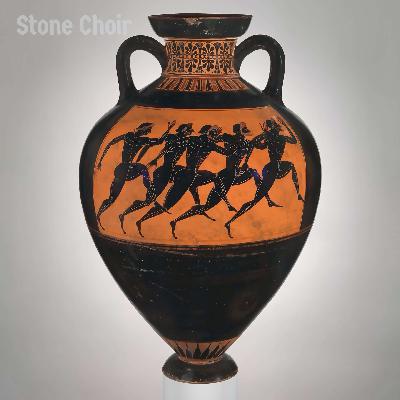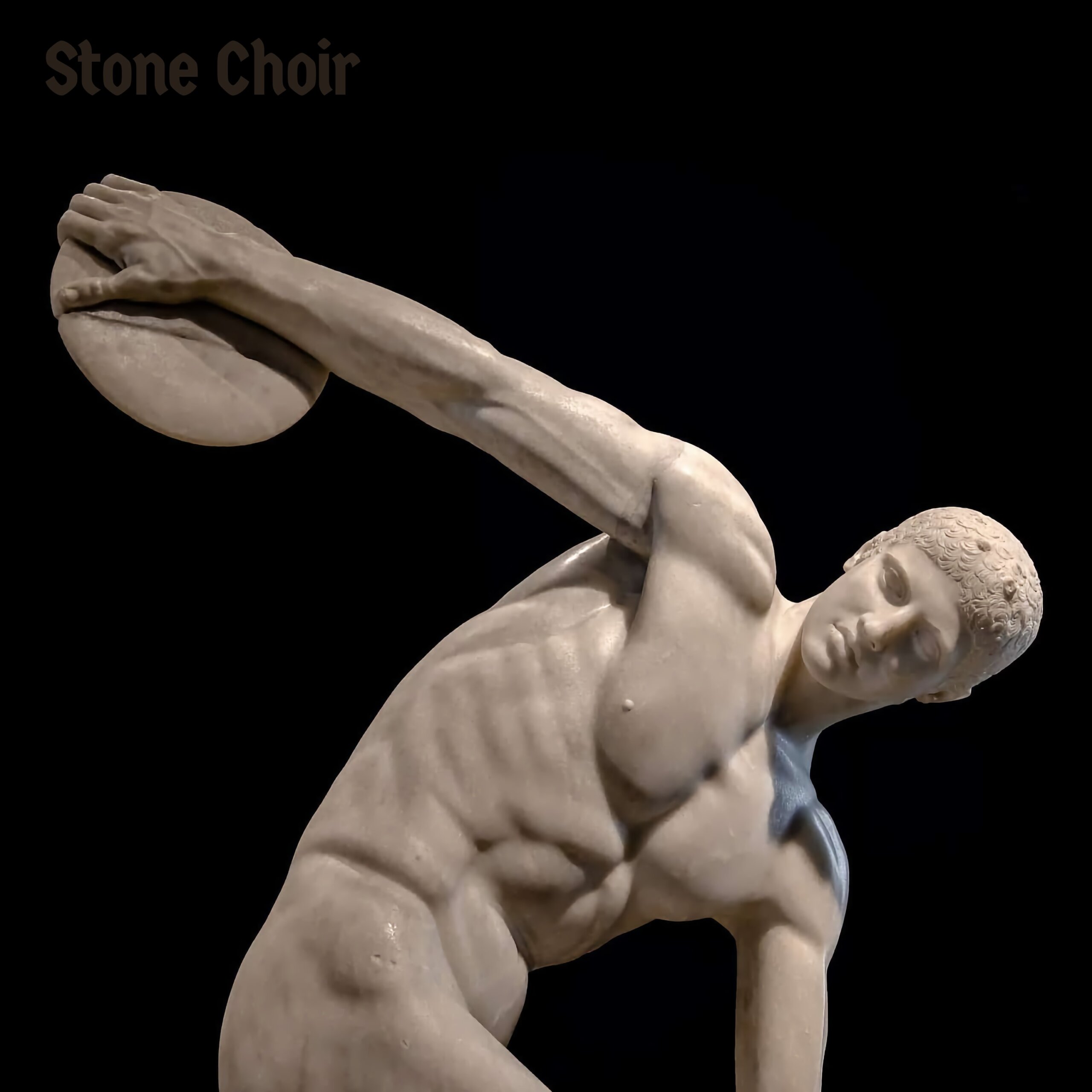Discover Stone Choir
Stone Choir

Stone Choir
Author: Stone Choir
Subscribed: 314Played: 18,811Subscribe
Share
© Stone Choir — 2022–2025, Some Rights Reserved
Description
Two Lutheran (LCMS) laymen bring a theological lens to the world, and relate the state of the world back to theology. Topics are timely, challenging, and fearless. We'll probably make you nervous, sometimes make you angry, but never leave you bored. We are the stones who cry out.
108 Episodes
Reverse
For everything there is a time, and a right time for every matter under heaven:
a right time to give birth, and a right time to die;
a right time to plant, and a right time to pluck up what is planted;
a right time to kill, and a right time to heal;
a right time to tear down, and a right time to build;
a right time to weep, and a right time to laugh;
a right time to mourn, and a right time to dance;
a right time to throw stones, and a right time to gather stones;
a right time to embrace, and a right time to be far from embracing;
a right time to seek, and a right time to lose;
a right time to keep, and a right time to throw away;
a right time to tear, and a right time to sew;
a right time to keep silence, and a right time to speak;
a right time to love, and a right time to hate;
a right time for war…
Show Notes
See Also
Further Reading
Parental Warnings
None.
In this final episode of the Septuagint (LXX) series, we discuss what needs to be done to produce a proper translation of the LXX in English. This a technical episode, but a vital one. There should exist in every language spoken by a Christian nation a definitive version of the Scriptures in that language, and in this episode we provide the structure and the mechanics by which that can be achieved.
This will be a years-long project, and it will have to be undertaken by other men. Until then, we have provided links to a number of existing English translations in the show notes, infra. Any existing version of the LXX in English is certainly better than all of the extant copies based on the rabbinic text.
Show Notes
English Septuagint Translations:
Brenton
Hardcover [English and Greek]
PDF
Lexham (2nd)
Hardcover
Logos
NETS
Hardcover
PDFs
Thomson, Charles
Archive.org PDF [free]
Logos [not free]
The Ancient Christian Study Bible (coming 2027)
See Also
The Göttingen Septuagint
Further Reading
Attribution-ShareAlike 4.0 International
The Canterbury Tales in Middle English and Modern English
Parental Warnings
None.
This episode is our closing argument for the Septuagint (LXX) and its proper place as the Word of God — the Scripture of the Early Church, the Apostles, and Christ Himself. Once you have finished this episode, you will need to decide for yourself if you believe the argument as presented or if you intend to double down on the ‘Hebrew’ the rabbis smuggled into the churches. The question is one of fidelity to God and to His Word, and it is a question that will split the churches, that will sift the wheat from the chaff.
“But I and my household will serve the Lord, because He is holy.”
Show Notes
Romans 2:24 → Isaiah 52:5
Romans 3:4 → Psalm 51:4 (LXX Psalm 50:6)
Romans 9:25b → Hosea 2:23
Romans 9:27 → Isaiah 10:22
Romans 9:27-28 → Isaiah 10:22-23
Romans 9:29 → Isaiah 1:9
Romans 9:33; 10:11 → Isaiah 28:16
Romans 10:18 → Psalm 19:4 (LXX Ps 18:5. .
Romans 11:10 → Psalm 69:23 (LXX Ps 68:24. …
Romans 11:26b → Isaiah 59:20
Romans 11:27 → Isaiah 27:9 (with Isa 59:21)
Romans 11:34 → Isaiah 40:13
Romans 12:19 → Deuteronomy 32:35
Romans 14:11 → Isaiah 45:23
Romans 15:12 → Isaiah 11:10
1 Corinthians 2:16 → Isaiah 40:13 …
1 Corinthians 14:21 → Isaiah 28:11-12
1 Corinthians 15:54 → Isaiah 25:8
1 Corinthians 15:55 → Hosea 13:14
1 Corinthians 1:31 and 2 Corinthians 10:17 - Jeremiah 9:24
2 Corinthians 4:13 → Psalm 116:10 (LXX 115:1)
Galatians 3:10 → Deuteronomy 27:26
Galatians 3:13 → Deuteronomy 21:23
Ephesians 4:26 → Psalm 4:4 (LXX 4:5)
Ephesians 5:31 → Genesis 2:24
Philippians 1:19 → Job 13:16
Philippians 2:10-11 → Isaiah 45:23
2 Thessalonians 1:9 → Isaiah 2:10, 19, 21
2 Timothy 2:19a → Numbers 16:5 …
Hebrews 1:6 → Deuteronomy 32:43 (LXX expanded line)
Hebrews 1:10-12 → Psalm 102:25-27 (LXX 101:26-28)
Hebrews 3:7-11 → Psalm 95:7-11 (LXX 94:7-11. …
Hebrews 8:8-12 → Jeremiah 31:31-34 (LXX 38:31-34)
Hebrews 10:5-7 → Psalm 40:6-8 (LXX 39:7-9)
Hebrews 10:37-38 → Habakkuk 2:3-4
Hebrews 11:21 → Genesis 47:31 …
Hebrews 12:5-6 → Proverbs 3:11-12
James 4:6 → Proverbs 3:34
1 Peter 2:6 → Isaiah 28:16
1 Peter 2:9 → Exodus 19:6 (phrase)
1 Peter 2:22 → Isaiah 53:9
1 Peter 4:18 → Proverbs 11:31
1 Peter 5:5 → Proverbs 3:34 (as in James 4:6)
Revelation 2:27, 12:5, 19:15 - Psalm 2:9
See Also
Further Reading
Parental Warnings
None.
In this episode and the next, we cover the places where the New Testament cites the Old Testament and there is a difference between the Septuagint (LXX) and the rabbinic text. In this first (of two) episodes, we cover citations from Matthew, Mark, Luke, John, and Acts; in the next episode, we will cover Romans through Revelation. By the sheer weight of the evidence, it will become undeniable that the New Testament authors were reading and citing the Septuagint — not some supposed ‘Hebrew’ edition (that, in fact, no longer existed at the time of the composition of the New Testament).
The Septuagint was the Bible of the Apostles; it was the Bible of the early Church; it was the Bible that God miraculously preserved — as He promised He would; and it should be our Bible today.
Show Notes
Verses
Vorlage over LXX
Matthew 2:15 → Hosea 11:1
Matthew 8:17 → Isaiah 53:4
Matthew 26:31 → Zechariah 13:7 (also Mark 14:27)
Matthew 27:9-10 → Zechariah 11:12-13 (with elements from Jeremiah 19; 32)
Mark 1:2 → Malachi 3:1 (also Luke 7:27)
John 19:37 quoting Zechariah 12:10
Romans 11:35 quoting Job 41:11 (MT 41:3)
LXX over MT
Matthew 1:23 → Isaiah 7:14
Matthew 3:3 → Isaiah 40:3
Matthew 3:17 (Mark, Luke) → (Genesis 22:2, 12, 16)
Matthew 17:5 (Mark, Luke)
Matthew 4:15-16 → Isaiah 9:1-2 (MT versification 8:23-9:1)
Matthew 11:10 → Malachi 3:1 (also Mark 1:2, Luke 7:27)
Matthew 12:18-21 → Isaiah 42:1-4
Matthew 13:14-15 → Isaiah 6:9-10
Matthew 15:8-9 → Isaiah 29:13
Matthew 19:5-6 → Genesis 2:24
Matthew 21:16 → Psalm 8:2 (LXX 8:3)
Matthew 24:29 → Isaiah 13:10, 34:4
Luke 2:23 → Exodus 13:2
Luke 3:4-6 → Isaiah 40:3-5
Luke 4:18-19 → Isaiah 61:1-2 (with Isa 58:6)
John 12:38 → Isaiah 53:1
Acts 2:26 → Psalm 16:9 (LXX 15)
Acts 7:14 → Genesis 46:27; Exodus 1:5
Acts 7:42-43 → Amos 5:25-27
Acts 8:32-33 → Isaiah 53:7-8
Acts 13:41 → Habakkuk 1:5
Acts 15:16-18 → Amos 9:11-12 (and the closing clause of v. 18)
See Also
Further Reading
Parental Warnings
None.
The rabbis made a number of different kinds of edits to their version of what some call ‘Scripture’ (i.e., the Rabbinic or Masoretic Text). In some places, they fiddled with numbers, in some they changed names, and in still others they deleted entire sections of the text. In this final episode of the Old Testament portion of the Septuagint series, we examine the changes the rabbis made to the timelines (particularly the genealogies), the Book of Job, the Book of Esther, and a few other miscellaneous matters.
The next two episodes will round out the LXX series with an examination of how the New Testament uses the Old (to the surprise of none, Jesus and the Apostles used the Septuagint), and then the final episode in the series will give a roadmap for where we, as the Church, go from here.
Show Notes
Esther: LXX and MT Compared
See Also
Letter: Origen to Africanus
Luther on the Rabbinic Book of Esther
Further Reading
Esther (Brenton)
Esther (NETS) [PDF]
Calendar Systems:
Anno Domini
Anno Mundi
Byzantine Calendar
“Setting the Record Straight on the Primeval Chronology of the Septuagint (Part 2)”
One example of differing chronologies (not an endorsement)
Pyramids and Sea Creatures in the Limestone [Just an interesting read.]
Parental Warnings
None.
As between the Septuagint (LXX) and the rabbinic text (MT), there are significant differences in the books that comprise the wisdom literature (i.e., Job, Psalms, Proverbs, Ecclesiastes, Song of Solomon). These differences range from changes in diction through distortions and corruptions to outright additions and deletions (one should think of the warning in the Book of Revelation). Out treatment here is not (and is not intended to be) comprehensive — there are centuries of work ahead of the Church; rather, we intend to drive home the point that the only Christian reaction is to abandon and anathematize the ‘Hebrew’ passed to us by the rabbis in favor of the Greek passed to us by Christ, the Apostles, and our faithful forebears — and, most importantly of all, preserved by God, as He promised.
Christ, the Apostles, and the early Church all unanimously held that the Septuagint is, indeed, the very Word of God. In this fifth episode in the (now) nine-episode LXX series, we examine differences between the LXX and the MT in the wisdom books (largely focusing on Proverbs). This is the second of three episodes dealing specifically with the Old Testament differences between the LXX and the MT.
This is, of course, not our closing argument, for we will be making that in the two episodes that deal with the New Testament and how it treats the Old Testament.
Show Notes
X thread on differences in Proverbs
See Also
Full Interview with Will Spencer [This will probably trigger as a download in your browser, and it is ~750MB.]
Further Reading
Parental Warnings
None.
As between the Septuagint (LXX) and the rabbinic text (MT), there are significant differences in many verses that deal with Christology. The MT is not always ‘less Christological’, for that would have been a poor-quality trap, but the proper hermeneutic for determining the text of Scripture is not ‘more Christology’; rather, the right hermeneutic is quite simply: What is Scripture and what does it say?
Christ, the Apostles, and the early Church all unanimously held that the Septuagint is, indeed, the very Word of God. In this fourth episode in the (now) nine-episode LXX series, we examine Christological differences between the LXX and the MT. This is the first of three episodes dealing specifically with the Old Testament differences between the LXX and the MT.
This is, of course, not our closing argument, for we will be making that in the two episodes that deal with the New Testament and how it treats the Old Testament.
Show Notes
Isaiah 7:14
Psalm 22:16
Psalm 2:10–12
Isaiah 6:8–10
Isaiah 9:6
Isaiah 53:5–6
Zechariah 12:10
Psalm 40:6–8
Amos 9:11–12
Deuteronomy 32:43
Isaiah 53:8–9
Isaiah 11:10
Psalm 23
See Also
Lexham LXX
Brenton LXX
Further Reading
Isaiah 53
Parental Warnings
None.
The story of how Hebrew was smuggled into the Western Church is long and complicated; it spans centuries and involves hundreds of men. In this episode, we have narrowed down the story to a handful of key figures who played pivotal roles. At many points in this timeline, Christian men could have stood up and defended the inspired Greek of the Septuagint, but essentially none did so. At any point in this timeline, Christian men could have stood up and repudiated the wicked use of the Hebrew, but only two did so — both former (converted) Jews. Satan does not have the limitation of a lifespan of but eighty or so years, and he does not sleep or grow tired; the story of Hebrew is the story of Satan’s long-term plan to undermine and collapse the Western Church, and, with her, Christendom.
In this second-half of the historical portion of the Septuagint series, we cover the history of the Western Church (from, roughly, Jerome to the Reformation) with regard to how Hebrew came to be used as the basis for the Old Testament. Notably, this history of the Septuagint is almost devoid of any actual use of the Septuagint by the men whose lives and actions make up the narrative, because we, like the Israelites of the Old Testament, left the Word of God sitting in a basement, abandoned and largely forgotten — and, worse, we accepted a corrupted counterfeit from rabbis and made it the basis of our translations. Mercifully and according to His promises, God preserved the Greek for us, and so we can undo the foolishness of centuries past — a topic we will take up in the last episode in this series.
Show Notes
See Also
Further Reading
“Johannes Reuchlin (1455–1522): A Unique Philosemitic Public Intellectual”
“Johannes Reuchlin: A Voice of Humanism and Esoteric Wisdom” [This site is full of things we categorically recommend against — it is linked for the sole purpose of this one article on Reuchlin.]
Parental Warnings
At the end of the episode, Luther is quoted and the quote includes the words “whore” and “slut”.
The Word of God has been preserved — miraculously — down through the ages, faithfully transmitted forward from past generations to us. This is according to God’s promises, and yet God nowhere (in the Old Testament) says which language He will use to accomplish this. Many have long claimed that God used Hebrew to do this, but the Hebrew language was never a true written language until the 20th century and, above and beyond this, the Hebrew language was dead for more than two thousand years. How, then, did God preserve His Word? He caused it to be translated into Greek — the Septuagint (LXX).
It was the Septuagint that was used by our forefathers in the faith, by the Apostles, and by Christ Himself. In this first of our four-part (really five-part) series on the Septuagint, we cover the history of the Hebrew language and the history of the LXX up until about AD 1000; we trace how the so-called “Masoretic Text” was infiltrated into the Church by those who deny Christ, curse His sheep, and serve another master, and how, tragically, Christians failed to prevent this and permitted the MT to supplant the LXX; and we begin to make our case for a return to the Word of God as He has preserved it and as the Church has always received it — in Greek, as the Septuagint.
Show Notes
See Also
Against the Judaizers
Further Reading
Letter of Aristeas [Wikipedia]
Greek and English
Although we do not (yet) have an English translation using the LXX that we unreservedly recommend, we recognize that some will want a version for the sake of comparison. This is one option: The Lexham English Septuagint
The Brenton edition can be found in several places online.
Parental Warnings
None.
All men have limitations — be they physical, intellectual, or something else. One such limitation is a thing we call, in the technology fields, a “context window”. In essence, a context window is the amount of relevant information that a man can hold in his mind at a given moment. In a conversation, it is the history of the conversation (along with any previous history from prior conversations, et cetera); in a relationship, it is the entire history of that relationship. In all cases, only to the extent such information can be held in the mind.
Some questions call for a small context window (e.g., a bar fight may require only ten or twenty minutes of context to understand) and some questions call for a significantly larger context window (e.g., the current state of the Western Church is a matter of millennia). Not all men are equally suited to handle all matters — a man can be competent or incompetent with regard to a particular question or a particular discussion. In this preliminary episode leading into our upcoming series on the Septuagint (LXX), we discuss the concept of a context window and how it plays into the LXX specifically and many issues in our daily lives generally.
Show Notes
See Also
Further Reading
What Is a Context Window? [YouTube]
Parental Warnings
None.
Man is an animal, created on the sixth day with all the other land creatures. And yet man is more than an animal, for man has not only body, but also mind and soul. To ignore the soul is to fall into Materialism; to ignore the body is to fall into Gnosticism. We must endeavor to fall off of neither side of the horse. This tripartite nature of man plays out in many things and in many ways; one of those things is addiction.
When a man (or a woman) becomes addicted to something — whether it is a substance (e.g., marijuana) or an activity (e.g., gambling) —, it is a matter of all three parts of man. The atheistic world would have us ignore the spiritual aspects of addiction (e.g., that it is sin); far too many Christians would have us ignore the biological and psychological aspects. God commands us to be wise, and so we must not ignore the good tools that science has put at our disposal — biology has given us insights into the physical bases for addiction and psychology has given us insights into the psychological aspects of addiction.
We do our brothers and sisters no good when we ignore the fullness of reality, and that holds no less true when dealing with addiction.
Show Notes
MBTI Assessment [one of many sites offering it]
Empathy Test
See Also
Further Reading
Parental Warnings
We discuss both pornography and sex in this episode. The discussion is not explicit, but you may wish to review it before listening with your children.
A true confession is not simply a matter of speaking a truth; rather, it is a matter of speaking the truth that is demanded under the circumstances. In fact, it is entirely possible to lie or to deceive with the truth. To say that it was the Romans who crucified Christ is entirely true, but to advance that particular truth in order to deny the truth that the Jews murdered the Lord Christ would be to lie with a truth. This is a tactic that Satan has employed from the very beginning.
Today, we most often see this playing out with Christians who run to their doctrinal statements or confessions when faced with novel problems. The battles of the Reformation era were important (and remain important), but they are not the things that Satan is attacking today. The man who holds up his confession and denies that he could ever be wrong because he has Abraham (his doctrinal statement) as his father has become a pharisee who follows after Satan’s footsteps in lying with the truth.
Confessions must not become idols, and the battles of centuries ago are not the battles of today. To look upon the bronze serpent because God commanded it is one thing; to worship the bronze serpent because you have distorted what it was is another matter entirely. Satan is rightly called a serpent — do not give him the opening he needs.
Show Notes
See Also
Further Reading
Parental Warnings
None.
In every endeavor, there is an excellence. A man can be excellent in his field, regardless or what it may be, or excellent at his undertaking, also regardless of what it may be. There are excellent paintings, excellent poems, excellent plays, excellent athletic performances, excellent shoes, and a whole host of other things that one could only begin to list. A part of the Christian life is recognizing the existence of excellence and then aiming for it.
Not all men can achieve the same level of excellence, not even all men engaged in the same field, but every man can recognize excellence and strive toward it. Further, we must recognize, respect, and honor excellence when and where we find it, instead of giving in to the tendency of the modern world to minimize and dismiss it. The man who is excellent in his field has achieved that excellence due both to natural talent (i.e., gifts from God) and hard work (i.e., the acquisition or skill or knowledge); every man, even and often in the mundane, is participating in the same sort of striving toward excellence.
We all see the man who wins some top athletic honor with his excellent performance, but what we do not see is the tens of thousands of hours of practice that went into that performance. Excellence does not fall from the sky (even if the gifts of God essentially do so), but is pursued with motivation and determination — it is a purpose toward which one strives. As Christians, we should recognize that all excellence is a gift from God, and we should honor and respect it when and where we find it, and then we should use it to motivate our own efforts, instead of joining the world in sarcasm or indifference.
Show Notes
kalos
areté
See Also
Further Reading
Parental Warnings
None.
For the moral man, duty forms the core of life, but duty must be translated into purpose before a man can act upon it. And purpose, standing alone, benefits man not at all, for one must also have the motivation to pursue one’s purposes. In this episode, we cover the relationship and nature of purpose and motivation and how they form the backbone of a life well lived.
Show Notes
See Also
Further Reading
Parental Warnings
None.
There is no blanket Christian duty to submit to wrongful authority; in fact, under certain circumstances, the Christian may even have an affirmative duty to resist the tyrant — even the tyrant who may claim to be a Christian himself. The Magdeburg Confession serves as a foundational document (arguably second only to Scripture) on the Doctrine of the Lesser Magistrate and Christian resistance to tyranny. For the Christian, the question is twofold:
When is it moral to resist the higher authority?
When is it wise to resist the higher authority?
It is incumbent on Christian men to consider these matters, for we have duties to those above us and to those below us (if any) in the social and political hierarchy. The Magdeburgers had to work through these issues while watching an imperial army make ready a siege that would eventually last more than a year and claim thousands of lives (mostly on the imperial side); we would do well to think through these matters now, while we yet enjoy relative peace.
Show Notes
The Magdeburg Confession [Amazon]
Romans 13
See Also
Further Reading
Parental Warnings
None.
Men do not need to be told that they have friends and they have enemies, and yet many modern Christians have been so propagandized by eisegesis and so misled by false teachers that they no longer believe that a Christian can have enemies, and yet Scripture clearly states that men will not only have enemies, but that some of those enemies will be in their own households. In this life, you will have friends and you will have enemies, some will be weak and some will be strong, some will abandon you when the tide turns and some will stand with you no matter what may come; being a Christian does not change this.
Yes, we are to forgive our personal enemies, but that does not thereby make them anything other than enemies, and to treat the friend and the enemy identically is to be derelict in the duties given us by God. We do service neither to God nor to the Church when we pretend that enemies are not enemies; in fact, it is that very sort of wickedness that drives many men away from the churches in disgust. As Christian men, we must reclaim a proper understanding of friend and enemy and a proper approach to dealing with both — not least of all when the enemies stand up in the churches, as they do all too often today.
Show Notes
I (Mahler) am aware of the audio issues with my track — there is nothing I can do about them. Somehow, my recording lost ~30dB despite sounding fine during recording. I will be reworking my audio stack (and likely purchasing more hardware) before the next episode in an attempt to guard against any future (inexplicable) issues.
See Also
Further Reading
“Personal or Public”
Parental Warnings
None.
Every man has a collection of interests. A man has an interest in his family; a man has an interest in his job; a man has an interest in his financial positions; a man has an interest in his city; a man has an interest in his nation. These interests can sometimes come into conflict. To have a conflict of interests does not mean that the man in question is necessarily compromised or untrustworthy, but it does mean that he is in a position where he will have to make a choice between those competing interests.
In our legal system, we recognize this in a number of ways. We take the interests of a witness into account when weighing his testimony (and not just for credibility purposes); we take into account whether a statement is made against interest; we dismiss jurors who have certain interests in the outcome of a given case. The same is true of many other parts of our government (e.g., regulators are supposed to at least disclose any interests they have in the entities they regulate).
It is not that having an interest means that a man is automatically disqualified; rather, it is that the interests of the man must be taken into account when assessing his arguments, and it is also that men should generally disclose their interests — and those who fail to do so are suspect. However, there most certainly are instances where a man with a conflict of interests should or even must be disqualified from participating in the discussion — this is not only to protect the discussion itself, but also to protect the man from having to make a choice between his legitimate (and possibly even equally important) interests.
Handling these issues is a matter of wisdom, and one that has been neglected for far too long in Christian circles. God does not command us to be fools; rather, He commands us to be wise and to be wary of wolves.
Show Notes
The Small Catechism — The Ten Commandments
See Also
Further Reading
Parental Warnings
None.
Hosts
Corey J. Mahlercoreyjmahler.com@CoreyJMahler
Woeaka Eschatologuy@treblewoe
Retribution is the debt that man owes to justice. Modern society would attempt to mislead you into thinking that rehabilitation or distribution or restoration or mercy are part of justice, but they are not. God is clear in His Word that justice is a matter of punishment of those who do wrong. The prince does not wield the sword in vain, and he will be judged by his faithful or for his faithless execution of his office.
In the coming years, and particularly in the coming year, there will be many who will attempt to conflate the mercy that God has shown us in the right-hand kingdom with the justice that He commands must be done in the left-hand kingdom. Clerics of all stripes will scream and cry that we must show ‘mercy’ and ‘forgiveness’ in the political realm instead of doing what is right and just — these men will be using their collars to spread lies, and God will judge them for their wickedness. Christian men must know how to rightly divide these matters and how to distinguish the voice of God from the lies of Satan — both our souls and our nation depend on this.
Show Notes
The 2024 Stone Choir Challenge Coin is still available. If you place your order by the 13th, it will arrive in time for Christmas.
See Also
Further Reading
Parental Warnings
None.
We often think of persecution as a matter external to the church, as something inflicted on the church; however, persecution is often — and these days most often — a matter within the church — the persecutors, the goats and the wolves, claim outward fellowship with the sheep. Persecution has almost always been a part of the Christian life, even if it has waxed and waned over the centuries (and some who lived under Christendom enjoyed relative peace). Today, we are faced with a period of increasing persecution; in fact, it is already in full swing.
If we, as Christians, are not prepared to face persecution, to persevere in the face of it, then we will almost certainly fall away from the faith when the persecution rises in intensity. There is a great apostasy that has been underway for decades, and now the world and the devil are earnestly seeking to persecute and destroy what remains of the Church on Earth, and they are aided in this by goats and wolves posing as sheep. The persecution of today, as has been the case with so much of the persecution of the past, comes largely from within the church, not from without her.
And yet persecution is not a cause for despair or even for worry — it is a reason to act. If we are to persevere, to run the race successfully, then we must spend time in the Word of God, be confident in our faith, and secure in our knowledge that God is always true to His promises, not least of all:
‘Blessed is the man who remains steadfast under trial, for when he has stood the test he will receive the crown of life, which God has promised to those who love Him.”
Show Notes
Acts 7
Romans 8
Hebrews 11–12
See Also
Further Reading
Germania by Tacitus [Amazon]
Parental Warnings
None.
Honor and loyalty are closely related concepts — even nearly, but not quite, identical. In this third (and final) part of our series on honor, we address the matter of loyalty — what it is, what it is not, when it is due, and, perhaps most importantly, when it is not due. To God and nation, a man owes absolute and unconditional loyalty; to family and country, man owes a high degree of loyalty; to all else, man owes only a conditional loyalty (if any at all).
Further, a teacher, particularly a teacher of the Word, is not personally owed loyalty because he teachers the word; rather, it is the Word to which one’s loyalty is owed. A teacher who was once true, but has become false, must be deserted and abandoned, as the higher duty to God always trumps. A corporate entity — whether a baker, a school, or a church — is generally not, in and of itself, owed any duty of loyalty at all.
Many attempt to exploit man’s sense of loyalty, but it is incumbent on the Christian man to know to whom loyalty is owed and to whom it is not owed.
Romans 13:7 (ESV):
»Pay to all what is owed to them: taxes to whom taxes are owed, revenue to whom revenue is owed, respect to whom respect is owed, honor to whom honor is owed.«
Show Notes
See Also
Further Reading
Parental Warnings
None.

























Appreciate the time and effort put in to these episodes. they have rehabilitated my faith in Christ and truth
It's ok to say they killed Christ when they say it. It happens fairly often. Sarah Silverman has a whole routine on the subject. She says if Jesus really rose from the dead they'd have to kill him again. Really hilarious.